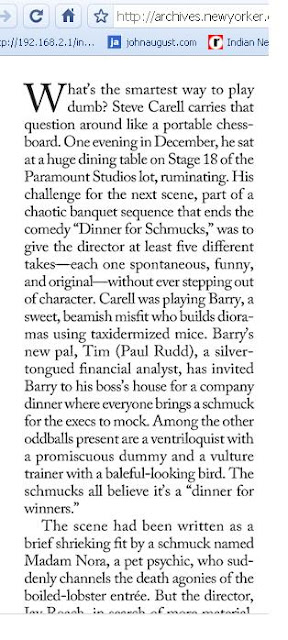The Hindi movie Bheja Fry is a remake--as far as I know of its provenance--of a French stage play adapted for the screen, much later made into a Hindi adaptation. The Hindi adaptation is extremely adeptly done, very economical in its exercise--adapting the plot, the characters, the language, the setting, etc--and therefore very resonant.
This The New Yorker article [unfortunately, requires a subscription to read, therefore no link included], describes Steve Carell playing one of the handful of idiots at a dinner party, for schmucks.
Jokes, as people tell and enjoy them, are perhaps among humanity's most profound mysteries. Not just in their usefulness [or lack thereof] to the species, but in their mechanics. Many have attempted to essentialize The Joke, but I am sure each attempt has failed.
But, there always seems to be an element of cruelty involved. Either towards oneself, or towards someone else. Things that are cruel towards others are funny [Yo Mama jokes, Sardaiji jokes, blonde jokes, practical jokes, Three Stooges, Benny Hill, Monty Python].
Things that punish oneself are more endearing, because they draw the Universe to the Personal [Chaplin, Buster Keaton, Monty Python, Kamal Hasan, Jim Carrey, Steve Carell]. Of course, it must appear that one doesn't know of this self-punishment, if this to be successful.
[Watch Kamal Hasan in Sadmaa for a wonderful performance where he is cruel to himself, with the full knowledge of what he is doing for the benefit of a demented, infantile Sridevi... Or, Jackie Chan in Little Big Warrior... This is the stuff Heroes are made of, when they make you laugh while knowingly sacrificing or imperiling their wellbeing]
This "Dinner Party" set up is always a mix of the two types: Schmucks think they are at the party because they are Winners; Winners bring Schmucks to the parties to reinforce their self-perception that they are Winners.
The winning formula: the guileless Schmuck proves to the Winner that the Winner is really the Schmuck, and that the Schmuck is much more of a Winner than the Winner could ever dream of becoming.
I have a notion that this formula works better in a hierarchy obsessed society that insists upon calling itself a meritocracy, like the USA. There, everyone is supposed to be an equal: but this applies only to the realm of the laws of the land, as derived from Enlightenment sources. Social life, however, revolves around Grecian ideals of super-humanism, Heroes [part-divine, proof seen in physical perfection and oversized ambitions matched by oversized achievements], the Olympian and the Nymph [the Jock and the Cheerleader] as archetypal aspirations.
The vast majority, however, is composed of people without the physical or social achievements that conform to the Grecian ideals of physical prowess or beauty or heroic achievements. Therefore the Schmuck. Not the perfect racial Anglo-Saxon, but the deformed Yid with thick glasses or the Gook or Chink with its excited jabber about gadgets and comic-books.
So, these types come to a clash: the product of Enlightenment--the tolerant, self-abusing Schmuck whose wealth is vast and internal--butts heads with the Grecian ideal. If you take that formula and make it into a thriller, you have Hugh Jackman, Ewan McGregor and Michelle Williams in Deception. If you make a post-Aptovian comedy, you get, I am guessing, Dinner with the Schmucks.

No comments:
Post a Comment
Thank you for the comment :)